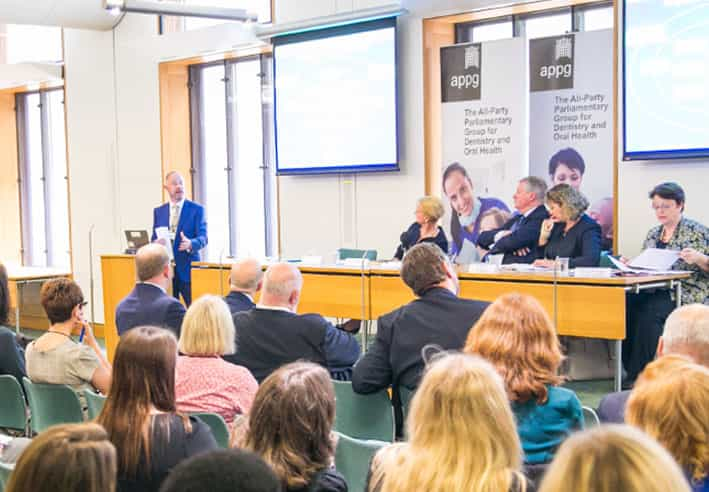With three dental schools, three dental hospitals and big city status I can see why there might be a perception that London is immune to the crisis in NHS dentistry. However, whilst this may have been the case once, I know first-hand that this is now demonstrably untrue.
It’s why I met with the London Assembly Health Committee last week to give oral evidence as part of their new inquiry into NHS dentistry in the capital, and to show just how deep the crisis goes.
What does a crisis look like?
As a dental consultant in Special Care Dentistry at a London hospital, I have seen the growing access crisis take its toll on the oral and wider health of patients.
In what feels like the new normal, we are increasingly seeing people turn up to A&E departments with dental problems. This should be unthinkable in the UK in the 21st Century, but we are now seeing patients admitted with life-threatening sepsis from a dental infection.
We now employ a full-time dentist within our department to see to the people who are due to have cardiac surgery but cannot have this procedure, until they have had a dental check.
Historically that was picked up on the high street, when people had their own dentist to access. But we have had such an influx of people who are unable to access care, and we have to pick up that slack.
So, there is no doubt in my mind that London is facing an access crisis. The total unmet need for NHS dentistry in the capital now stands at roughly 2 million people, and children in London are least likely to access an NHS dentist when compared to the rest of the country.
There are also huge inequalities in oral health and access to dentistry in London. Poor commissioning arrangements mixed with workforce challenges have resulted in a growing postcode lottery.
Only 32% of children in Hackney were seen by an NHS dentist in the last 12 months, compared to 60% in Hounslow. And just 25% of adults in Tower Hamlets have been seen by an NHS dentist in the last years, compared to 50% in Hammersmith and Fulham.
The data is clear. This is a national crisis, and no region is untouched.
Filling a leaky bucket
Is this just a workforce issue? I was asked if London simply needed more dentists.
I was brutally honest. Until the contract is reformed, there is no point looking at numbers of dentists because if you train more dentists to go into a leaking bucket, you are not fixing the problem.
Under the current NHS system, delivering care to some patients often ends up costing the dentist more than they receive for providing it. The only way out of this crisis is fundamental reform of the broken NHS dental contract, so dentists are finally allowed to provide the preventative care that patients need, whilst being fairly remunerated.
But as I told Assembly Members, instead of meaningful reform, we’ve only seen tweaks. There is little evidence the Recovery Plan has made any difference to patients struggling to access care with only 4% of dental practices in London benefitting from the increase in the minimum UDA rate to £28.
The 3 Rs
The London Mayor and the London Assembly do not have all the powers to hand to end this crisis. But they do have influence on the direction taken by a new Government.
The fundamental objective has to be reform. The Mayor can and should put pressure to urgently pursue contract reform so that dentists are finally able to provide the care that they want to give to patients that so desperately need it.
Then there’s the ringfence. While we wait on real change it is fundamental that we protect funding for NHS dentistry. That means ensuring any clawback doesn’t plug holes in other budgets, that it actually funds preventive schemes and innovative solutions which increase access to dental care.
And finally, there’s rollout. London has already shown leadership on free school meals, and the Mayor can do the same by going further and faster on supervised toothbrushing than the Westminster Government and rolling out a universal programme for all primary school children in the capital.
Similar cost-effective schemes have been tried and tested in Wales and Scotland and led to unprecedented improvements in child oral health there. Children in London deserve no less.
We are taking every opportunity to keep the pressure on decision makers to deliver the change that both dentists and patients need.
The London Assembly Health Committee are running a call for written evidence until 6 September 2024. We will be responding on your behalf, but dentists can submit their own response to the inquiry.


